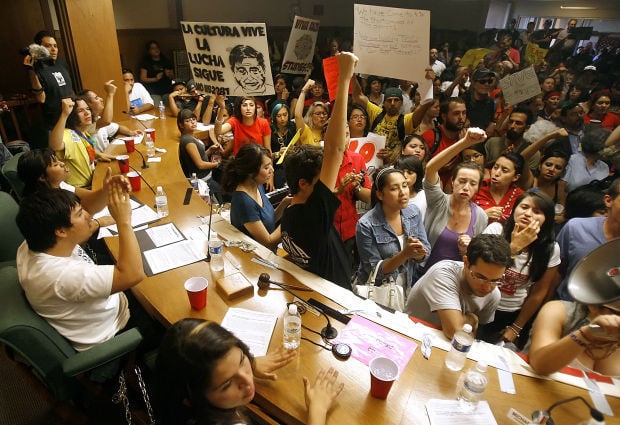Years of protest and unsuccessful litigation have all come to this: The U.S. 9th Circuit Court of Appeals will be asked on Monday to kill an Arizona law that led to the dismantling of TUSD’s Mexican American Studies program.
Ethnic-studies supporters and a team of attorneys will argue before a three-judge panel in San Francisco on whether the law is constitutional in the case against former Arizona schools chief John Huppenthal and the state Board of Education.
On Saturday, in advance of the hearing, the Latino Learning Partnership held an Ethnic Studies Summit and Teach-In at a San Francisco high school for students, teachers and community activists.
Organizer Curtis Acosta said in an email that the summit was intended to be an opportunity to discuss past and future efforts in the struggle for ethnic studies.
While the case is being fought by community members rather than the Tucson Unified School District itself, TUSD has much to gain from the law being reviewed and possibly overturned.
As it stands now, school districts found in violation face the threat of losing 10 percent of their monthly state aid until they come into compliance. For TUSD, that amounts to about $14 million a year.
While TUSD could not sustain that type of financial hit, the district’s superintendent says you cannot put a price tag on the lessons imparted by an ethnic studies education.
“Ethnic studies aren’t about teaching hatred; it’s rather about teaching understanding,” TUSD Superintendent H.T. Sanchez said. “And in the world we live in today, we need more understanding for each other. We need to appreciate and recognize that the strength of this nation isn’t isolated thought but rather the multitude of perspectives to the issues that are so big, but when we face them together are not as big and not as insurmountable.”
Delivering those lessons and insight requires a deep commitment, Sanchez said, one that could be made easier without the Arizona law in place.
“We could do our work under less of a feeling of threat,” Sanchez said. “If you are working because you are compelled to do it and believe it’s right, it changes the way people approach and feel about the work.”
Nonetheless, if the law is not overturned, TUSD will continue toward making its culturally relevant courses a national standard for excellence in ethnic studies.
Minimally, Sanchez would like to gain some clarity on what the standard of the law is — how school districts can know whether they are in line with the law or if they’ve violated it.
“The fact is that the law is so broad, it can be interpreted any way any person wants,” Sanchez said. “That’s the issue we’ve had with it — it’s about someone’s opinion. I hope the decision is balanced and based on a good review of the Constitution.”
While it is not clear how soon the court will issue a decision, it could come within 90 days of the arguments, said attorney Erwin Chemerinsky, who is representing the plaintiffs — students Maya Arce, daughter of Sean Arce, former director of TUSD’s Mexican American Studies program; and Korina Lopez, daughter of Lorenzo Lopez Jr., a former MAS teacher and the current TUSD director of culturally relevant pedagogy and instruction.
The law in question, which went into effect at the end of 2010, prohibits courses that promote the overthrow of the United States government, promote resentment toward a race or class of people, and advocate ethnic solidarity rather than the treatment of pupils as individuals.
Representatives for the state Department of Education argue that enacting such a law falls well within the state’s authority over curriculum.
Within the last three years, Huppenthal has found Tucson’s largest school district to be in violation of the law twice, with the most recent ruling coming Jan. 2 during his final hours in public office.
While the school district appealed the first finding of noncompliance, facing the possible loss of funding it decided to eliminate the nationally recognized history and literature courses taught from a Mexican-American perspective after an administrative law judge sided with the state.
By August 2013, a new iteration of the ethnic studies classes returned to TUSD high schools, once again putting the district under the state’s microscope, with the administration now being forced to prove it is following the letter of the law.
If the school district fails to come into compliance over the next 60 days — before a 9th Circuit decision may be rendered — it could lose millions of dollars in state funding.
Chemerinsky hopes to persuade the Court of Appeals to overturn the law by focusing on First Amendment free-speech and equal-protection violations, he said.
The first amendment protects students’ rights to receive information in school curricula, but the ethnic studies supporters argue that, while state and local officials have discretion in selecting material, that does not extend to removing curricular materials based on ideological viewpoint.
Chemerinsky also will lodge an equal-protection argument based on the possibility the defendants had a discriminatory motive in enacting and enforcing the law.
But the state’s legal counsel has also said protecting a student’s right to receive information is not implicated by a law that limits curricula to “pursue a goal of reducing racism.”
Attorneys for the state will also ask the court to reject the plaintiffs’ equal-protection argument, saying the Legislature did not act with discriminatory intent in enacting the law nor did the superintendent of public instruction in enforcing it.





